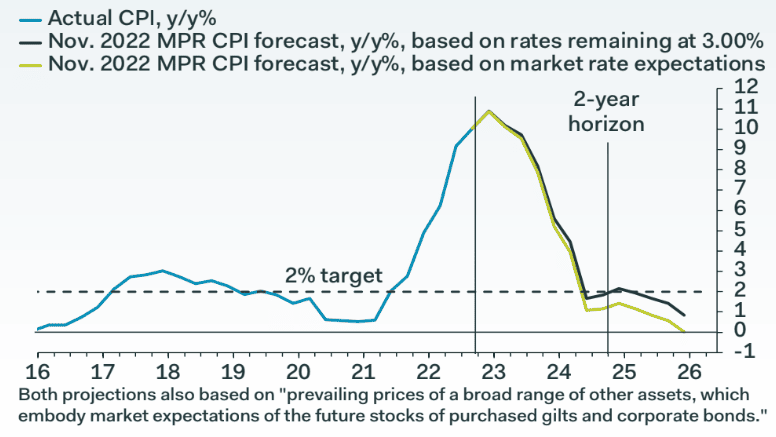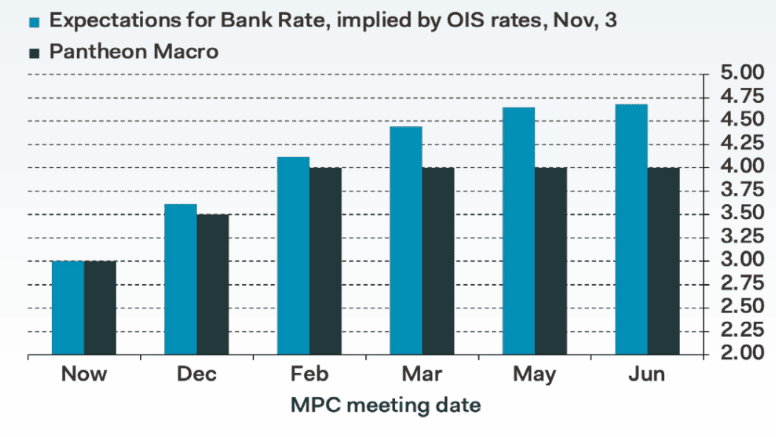Bank of England Interest Rate Forecasts: More Work To Do
- Written by: Gary Howes

Image © Adobe Images
Markets and analysts alike are of the view the Bank of England has more work to do, despite the protestations of Governor Andrew Bailey that, "we think bank rate will have to go up less than what’s currently priced into financial markets".
The Bank hiked interest rates 75 basis points on Thursday and revealed another set of economic forecasts that painted a picture of an economy heading for a deep and enduring slowdown.
Bailey and the Monetary Policy Committee were at pains to push back against the market's expectation that Bank Rate would be rising to at least 5.0% in 2023, saying that such a move would result in a deep eight-quarter-long recession.
Under such assumptions, they said inflation would fall to 0% in three years' time and growth would contract 1.9% in 2023 alone.
The push-back prompted a fall in the Pound but only a slight decline in market expectations for Bank Rate.
Money market pricing shows investors have only pared back expectations marginally, despite the Bank's guidance, showing the terminal rate is expected to be at around 4.75%, not far off the level expected in the hours leading into Thursday's policy decision.
"We maintain our view that the MPC will need to take Bank Rate into significantly restrictive territory given the tight labour market, firm inflation momentum, and high wage pressures," says Sven Jari Stehn, chief European economist at Goldman Sachs.
Following a 50bp in December, Goldman Sachs look for another 50bp in February, 25bp in March, and a final 25bp in May for a terminal rate of 4.5%.
Above: "The MPC's new forecasts signal rate expectations are too high." - Pantheon Macroeconomics.
Capital Economics thinks the Bank will be disappointed by the slow decline in inflation over the coming months.
Economists there forecast inflation to be stickier than the Bank expects and that real activity and the labour market will be a bit more resilient.
"While we wouldn’t rule out a lower peak in interest rates, we think that the MPC may be forced to change its tune and raise interest rates by 75bps in December, by 50bps in both February and March and by 25bps in May, taking rates to a peak of 5.00%," says Ruth Gregory, Senior UK Economist at Capital Economics.
The Bank of England appears concerned with the impact of higher interest rates on the housing market and the ultimate hit to consumer confidence.
The rise in rates will therefore slow the economy and bring inflation down, according to their calculations.
But Governor Bailey acknowledged in the press conference risks to the inflation outlook remain tilted to the upside.
Therefore, for the Bank to exit its hiking cycle close to 4%, inflation and inflation expectations must start to cool over the coming two to three months.
Philip Shaw, an economist at Investec, says the MPC will sanction a 50bp hike at its next meeting in December and then slow down as the realities of recession become clear.
"Such an increase might well bring the peak within sight and our baseline case remains that the top of the policy rate cycle will be reached in Q1 next year, at 4.0%," he says.
Samuel Tombs, Chief UK Economist at Pantheon Macroeconomics says the market's current expectation for then peak in Bank Rate at 4.75% is still too high.
"The current path for rates expected by investors still looks higher than the MPC likely will implement," he says.
Above: "We continue to expect Bank Rate to peak at 4.0% next year." - Pantheon Macroeconomics.
Pantheon Macroeconomics calculates the MPC would need to increase Bank Rate only to 3.5% in order for inflation to hit the 2% target on the nose in two years' time.
Their calculations also find that simply keeping Bank Rate at 3.0% will do enough to bring domestically-generated inflation back to its target-consistent level.
What's more, the fiscal tightening that will be announced by the government in its Autumn Statement on November 17 will provide a significant drag on the economy.
Pantheon Macroeconomics estimates the scale of tax hikes and spending cuts could force a further downgrade to the Bank of England's GDP forecasts to the tune of 0.5pp.
"In turn, the BoE’s latest forecasts imply that Bank Rate would have to be about 60bp lower than otherwise to offset this fiscal tightening," says Tombs.
Pantheon Macroeconomics forecasts the Bank of England will raise Bank Rate to 3.5% in December and to 4.0% in February, and then leave it at this level for the rest of 2023.
Compare Currency Exchange Rates
Find out how much you could save on your international transfer
Estimated saving compared to high street banks:
£2,500.00
Free • No obligation • Takes 2 minutes





